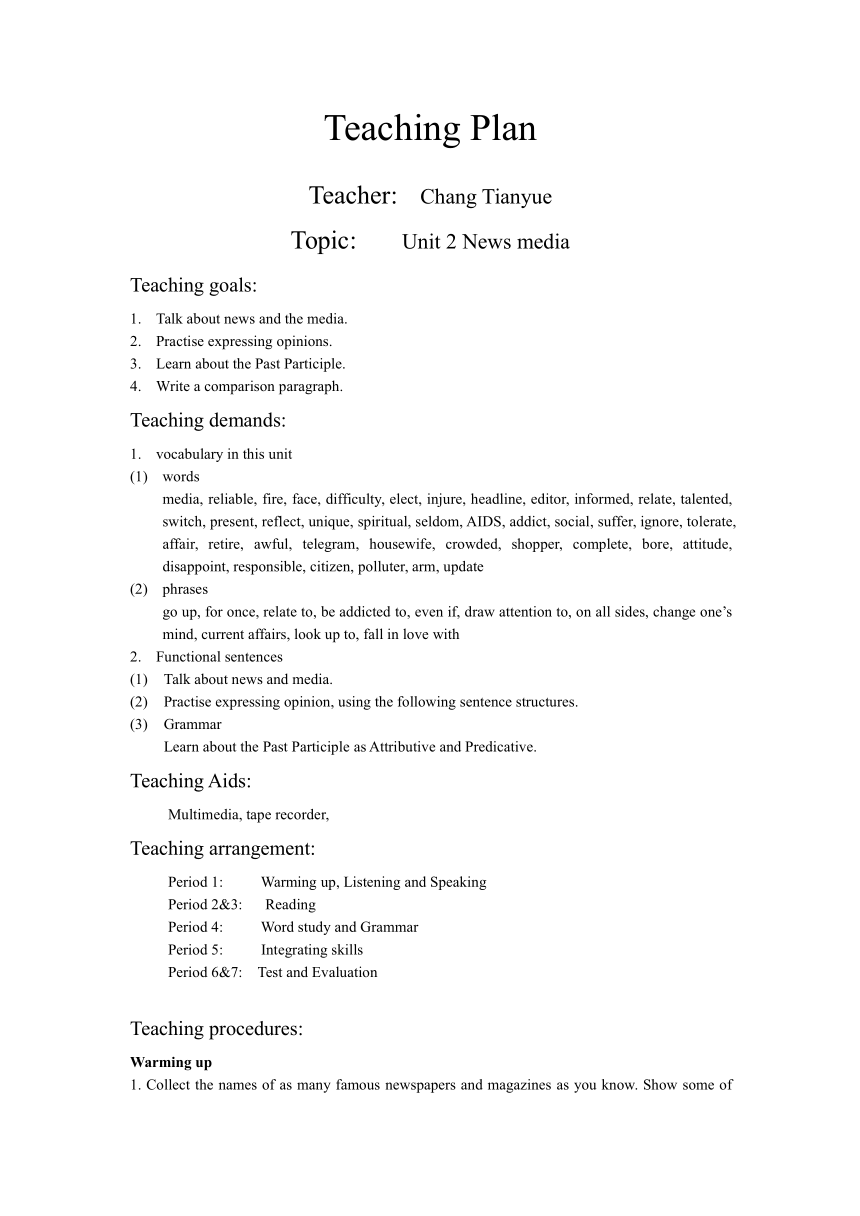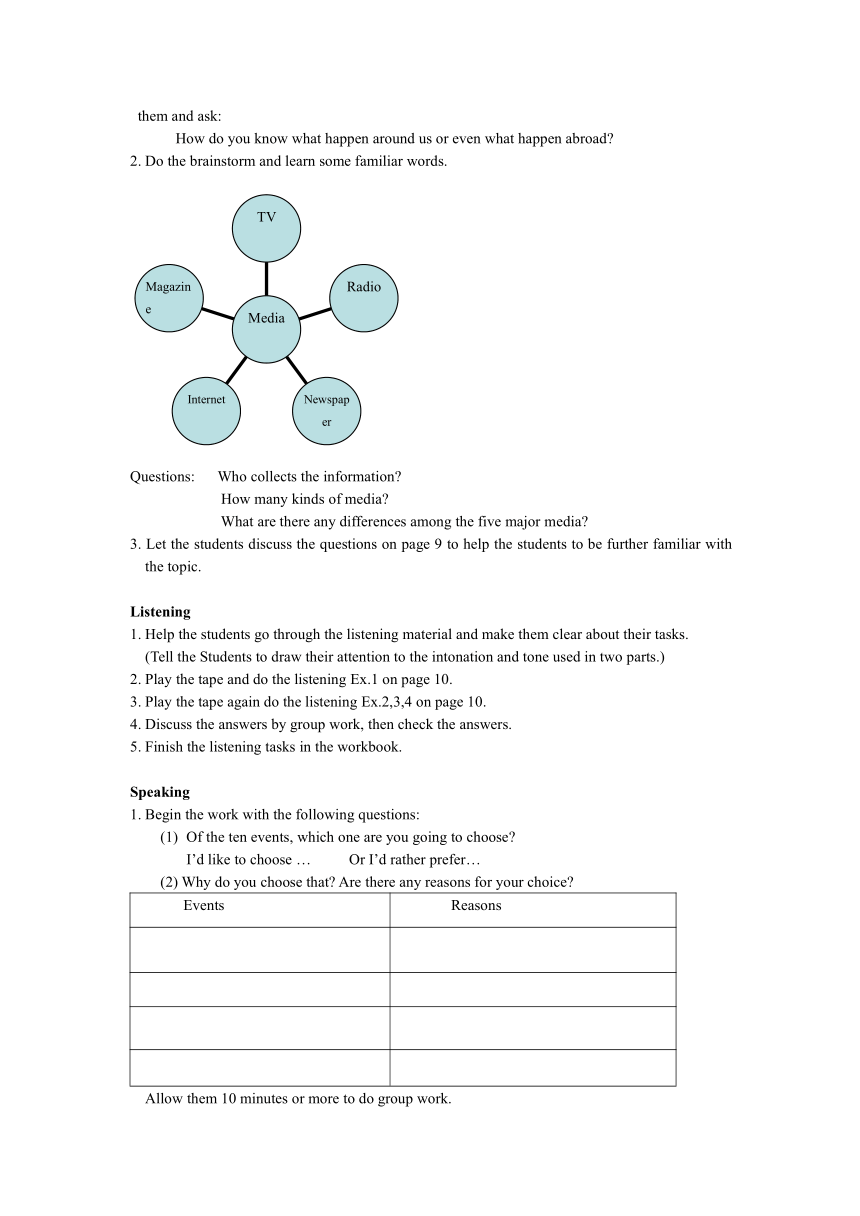Unit2 News media[上学期]
图片预览


文档简介
Teaching Plan
Teacher: Chang Tianyue
Topic: Unit 2 News media
Teaching goals:
1. Talk about news and the media.
2. Practise expressing opinions.
3. Learn about the Past Participle.
4. Write a comparison paragraph.
Teaching demands:
1. vocabulary in this unit
(1) words
media, reliable, fire, face, difficulty, elect, injure, headline, editor, informed, relate, talented, switch, present, reflect, unique, spiritual, seldom, AIDS, addict, social, suffer, ignore, tolerate, affair, retire, awful, telegram, housewife, crowded, shopper, complete, bore, attitude, disappoint, responsible, citizen, polluter, arm, update
(2) phrases
go up, for once, relate to, be addicted to, even if, draw attention to, on all sides, change one’s mind, current affairs, look up to, fall in love with
2. Functional sentences
(1) Talk about news and media.
(2) Practise expressing opinion, using the following sentence structures.
(3) Grammar
Learn about the Past Participle as Attributive and Predicative.
Teaching Aids:
Multimedia, tape recorder,
Teaching arrangement:
Period 1: Warming up, Listening and Speaking
Period 2&3: Reading
Period 4: Word study and Grammar
Period 5: Integrating skills
Period 6&7: Test and Evaluation
Teaching procedures:
Warming up
1. Collect the names of as many famous newspapers and magazines as you know. Show some of them and ask:
How do you know what happen around us or even what happen abroad
2. Do the brainstorm and learn some familiar words.
Questions: Who collects the information
How many kinds of media
What are there any differences among the five major media
3. Let the students discuss the questions on page 9 to help the students to be further familiar with the topic.
Listening
1. Help the students go through the listening material and make them clear about their tasks.
(Tell the Students to draw their attention to the intonation and tone used in two parts.)
2. Play the tape and do the listening Ex.1 on page 10.
3. Play the tape again do the listening Ex.2,3,4 on page 10.
4. Discuss the answers by group work, then check the answers.
5. Finish the listening tasks in the workbook.
Speaking
1. Begin the work with the following questions:
(1) Of the ten events, which one are you going to choose
I’d like to choose … Or I’d rather prefer…
(2) Why do you choose that Are there any reasons for your choice
Events Reasons
Allow them 10 minutes or more to do group work.
2. Give evaluation to each group.
Pre-reading
1. Look at the pictures on Page 11, ask two questions and predict about the text.
Questions: (1) Where are people in the first picture
(2) What are they doing
2. Allow the students a few minutes to discuss the questions listed on the textbook.
Reading
1. Scan the passage to match the following:
Decide what to write about Paragraph 1
Uses of news media Questions1 and answers
General description of newspapers Question2 and answers
Journalists’ favorite articles Question3 and answers
Topics they are interested in Last paragraph
2. Careful reading:
(1) General description of newspaper (Paragraph 1)
Questions: (a) What is the topic of the first paragraph
(b) What are the supporting sentences
(2) Decide what to write about (Question 1)
Editor’s job (by Zhu Lin) Reporter’s job (by Chen Ying)
1.2. 1.2.
(3) Their favorite stories (Questions 2)
Chen Ying’s:
Her difficulties;
Reasons:
Zhu Lin’s:
Reasons:
(4) Topics they’re interested in (Questions 3)
Zhu Lin:
Cheng Ying:
(Why)
A reporter’s basic task:
(5) Uses of new media (Last Paragraph)
(How important news media are!)
a. help solve problems and draw attention to situations where help is needed.
b. help people become interested in important questions around the world.
c. help people all over the world know about each other.
3. Do the post-reading questions.
Language study:
Ask students to study the following sentences and try to get the meaning of the sentences, encouraging them to use a dictionary if necessary.
1. Experienced editors and reporters make informed decisions about what events to report, how to report them, and why.
2. The editor’s job is to keep the newspaper balanced and interesting to the readers.
Grammar:
Give some examples to students and ask them to study the usage of the Past Participle:
1. the burned log/ an escaped prisoner/developed countries/fallen leaves.
2. I bought some painted chairs.
3. That is a newly-invented device.
4. After a tiring day , you feel tired.
5. Don’t get excited.
6. Summer is gone.
Ask them to make as many sentences as they can, using the infinitive.
Integrating skills
1. Let the students read the text and answer questions on the textbook.
2. Compare two reports and fill in the form.
Difference between two reports
First description Second description
people caring citizens
caused trouble made their voices heard
most successful company the city’s worst polluter
the rude and noisy group the citizens…who love nature and our planet
made it difficult for workers talked to workers… left a positive message
troublemakers activists
3. Write a comparison Paragraph ( according to the information on the textbook)
Homework
1. Learn the new words and the useful expressions by heart.
2. Read more news items about science from newspapers or magazines.
3. Write a piece of news using the skills you got in learning this unit.
Media
TV
Internet
Magazine
Radio
Newspaper
Teacher: Chang Tianyue
Topic: Unit 2 News media
Teaching goals:
1. Talk about news and the media.
2. Practise expressing opinions.
3. Learn about the Past Participle.
4. Write a comparison paragraph.
Teaching demands:
1. vocabulary in this unit
(1) words
media, reliable, fire, face, difficulty, elect, injure, headline, editor, informed, relate, talented, switch, present, reflect, unique, spiritual, seldom, AIDS, addict, social, suffer, ignore, tolerate, affair, retire, awful, telegram, housewife, crowded, shopper, complete, bore, attitude, disappoint, responsible, citizen, polluter, arm, update
(2) phrases
go up, for once, relate to, be addicted to, even if, draw attention to, on all sides, change one’s mind, current affairs, look up to, fall in love with
2. Functional sentences
(1) Talk about news and media.
(2) Practise expressing opinion, using the following sentence structures.
(3) Grammar
Learn about the Past Participle as Attributive and Predicative.
Teaching Aids:
Multimedia, tape recorder,
Teaching arrangement:
Period 1: Warming up, Listening and Speaking
Period 2&3: Reading
Period 4: Word study and Grammar
Period 5: Integrating skills
Period 6&7: Test and Evaluation
Teaching procedures:
Warming up
1. Collect the names of as many famous newspapers and magazines as you know. Show some of them and ask:
How do you know what happen around us or even what happen abroad
2. Do the brainstorm and learn some familiar words.
Questions: Who collects the information
How many kinds of media
What are there any differences among the five major media
3. Let the students discuss the questions on page 9 to help the students to be further familiar with the topic.
Listening
1. Help the students go through the listening material and make them clear about their tasks.
(Tell the Students to draw their attention to the intonation and tone used in two parts.)
2. Play the tape and do the listening Ex.1 on page 10.
3. Play the tape again do the listening Ex.2,3,4 on page 10.
4. Discuss the answers by group work, then check the answers.
5. Finish the listening tasks in the workbook.
Speaking
1. Begin the work with the following questions:
(1) Of the ten events, which one are you going to choose
I’d like to choose … Or I’d rather prefer…
(2) Why do you choose that Are there any reasons for your choice
Events Reasons
Allow them 10 minutes or more to do group work.
2. Give evaluation to each group.
Pre-reading
1. Look at the pictures on Page 11, ask two questions and predict about the text.
Questions: (1) Where are people in the first picture
(2) What are they doing
2. Allow the students a few minutes to discuss the questions listed on the textbook.
Reading
1. Scan the passage to match the following:
Decide what to write about Paragraph 1
Uses of news media Questions1 and answers
General description of newspapers Question2 and answers
Journalists’ favorite articles Question3 and answers
Topics they are interested in Last paragraph
2. Careful reading:
(1) General description of newspaper (Paragraph 1)
Questions: (a) What is the topic of the first paragraph
(b) What are the supporting sentences
(2) Decide what to write about (Question 1)
Editor’s job (by Zhu Lin) Reporter’s job (by Chen Ying)
1.2. 1.2.
(3) Their favorite stories (Questions 2)
Chen Ying’s:
Her difficulties;
Reasons:
Zhu Lin’s:
Reasons:
(4) Topics they’re interested in (Questions 3)
Zhu Lin:
Cheng Ying:
(Why)
A reporter’s basic task:
(5) Uses of new media (Last Paragraph)
(How important news media are!)
a. help solve problems and draw attention to situations where help is needed.
b. help people become interested in important questions around the world.
c. help people all over the world know about each other.
3. Do the post-reading questions.
Language study:
Ask students to study the following sentences and try to get the meaning of the sentences, encouraging them to use a dictionary if necessary.
1. Experienced editors and reporters make informed decisions about what events to report, how to report them, and why.
2. The editor’s job is to keep the newspaper balanced and interesting to the readers.
Grammar:
Give some examples to students and ask them to study the usage of the Past Participle:
1. the burned log/ an escaped prisoner/developed countries/fallen leaves.
2. I bought some painted chairs.
3. That is a newly-invented device.
4. After a tiring day , you feel tired.
5. Don’t get excited.
6. Summer is gone.
Ask them to make as many sentences as they can, using the infinitive.
Integrating skills
1. Let the students read the text and answer questions on the textbook.
2. Compare two reports and fill in the form.
Difference between two reports
First description Second description
people caring citizens
caused trouble made their voices heard
most successful company the city’s worst polluter
the rude and noisy group the citizens…who love nature and our planet
made it difficult for workers talked to workers… left a positive message
troublemakers activists
3. Write a comparison Paragraph ( according to the information on the textbook)
Homework
1. Learn the new words and the useful expressions by heart.
2. Read more news items about science from newspapers or magazines.
3. Write a piece of news using the skills you got in learning this unit.
Media
TV
Internet
Magazine
Radio
Newspaper
